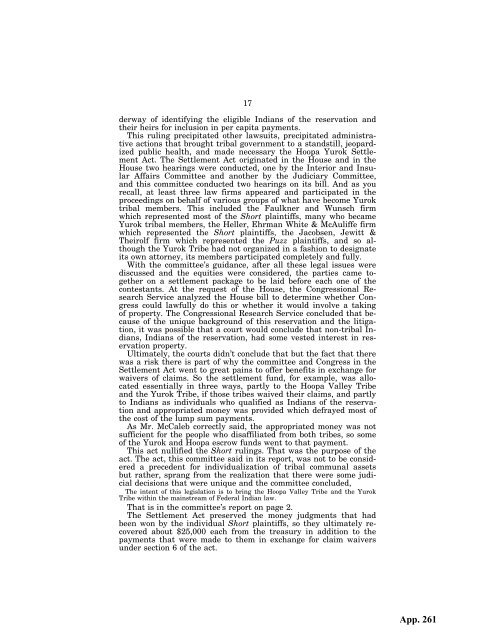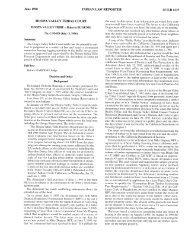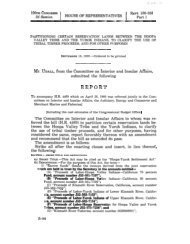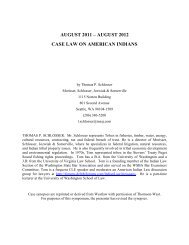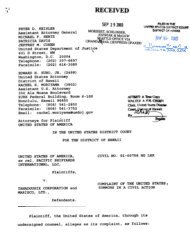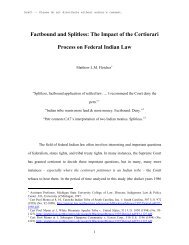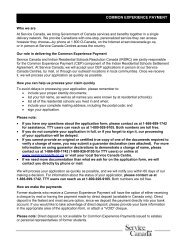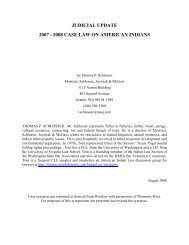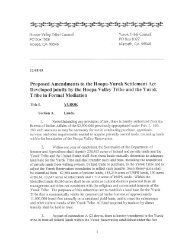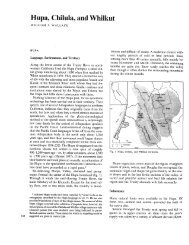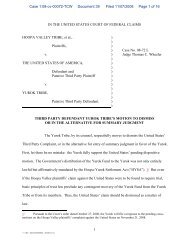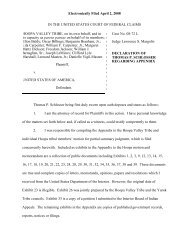Hoopa appendix supporting summary judgment - Schlosser Law Files
Hoopa appendix supporting summary judgment - Schlosser Law Files
Hoopa appendix supporting summary judgment - Schlosser Law Files
Create successful ePaper yourself
Turn your PDF publications into a flip-book with our unique Google optimized e-Paper software.
17<br />
derway of identifying the eligible Indians of the reservation and<br />
their heirs for inclusion in per capita payments.<br />
This ruling precipitated other lawsuits, precipitated administrative<br />
actions that brought tribal government to a standstill, jeopardized<br />
public health, and made necessary the <strong>Hoopa</strong> Yurok Settlement<br />
Act. The Settlement Act originated in the House and in the<br />
House two hearings were conducted, one by the Interior and Insular<br />
Affairs Committee and another by the Judiciary Committee,<br />
and this committee conducted two hearings on its bill. And as you<br />
recall, at least three law firms appeared and participated in the<br />
proceedings on behalf of various groups of what have become Yurok<br />
tribal members. This included the Faulkner and Wunsch firm<br />
which represented most of the Short plaintiffs, many who became<br />
Yurok tribal members, the Heller, Ehrman White & McAuliffe firm<br />
which represented the Short plaintiffs, the Jacobsen, Jewitt &<br />
Theirolf firm which represented the Puzz plaintiffs, and so although<br />
the Yurok Tribe had not organized in a fashion to designate<br />
its own attorney, its members participated completely and fully.<br />
With the committee’s guidance, after all these legal issues were<br />
discussed and the equities were considered, the parties came together<br />
on a settlement package to be laid before each one of the<br />
contestants. At the request of the House, the Congressional Research<br />
Service analyzed the House bill to determine whether Congress<br />
could lawfully do this or whether it would involve a taking<br />
of property. The Congressional Research Service concluded that because<br />
of the unique background of this reservation and the litigation,<br />
it was possible that a court would conclude that non-tribal Indians,<br />
Indians of the reservation, had some vested interest in reservation<br />
property.<br />
Ultimately, the courts didn’t conclude that but the fact that there<br />
was a risk there is part of why the committee and Congress in the<br />
Settlement Act went to great pains to offer benefits in exchange for<br />
waivers of claims. So the settlement fund, for example, was allocated<br />
essentially in three ways, partly to the <strong>Hoopa</strong> Valley Tribe<br />
and the Yurok Tribe, if those tribes waived their claims, and partly<br />
to Indians as individuals who qualified as Indians of the reservation<br />
and appropriated money was provided which defrayed most of<br />
the cost of the lump sum payments.<br />
As Mr. McCaleb correctly said, the appropriated money was not<br />
sufficient for the people who disaffiliated from both tribes, so some<br />
of the Yurok and <strong>Hoopa</strong> escrow funds went to that payment.<br />
This act nullified the Short rulings. That was the purpose of the<br />
act. The act, this committee said in its report, was not to be considered<br />
a precedent for individualization of tribal communal assets<br />
but rather, sprang from the realization that there were some judicial<br />
decisions that were unique and the committee concluded,<br />
The intent of this legislation is to bring the <strong>Hoopa</strong> Valley Tribe and the Yurok<br />
Tribe within the mainstream of Federal Indian law.<br />
That is in the committee’s report on page 2.<br />
The Settlement Act preserved the money <strong>judgment</strong>s that had<br />
been won by the individual Short plaintiffs, so they ultimately recovered<br />
about $25,000 each from the treasury in addition to the<br />
payments that were made to them in exchange for claim waivers<br />
under section 6 of the act.


